click image for more information on Our Lady of Knock
Accessibility Tools

Aug 21
click image for more information on Our Lady of Knock
Permanent link to this article: https://bookofheaven.org/2015/08/21/feast-day-of-our-lady-of-knock-august-21/
Aug 19
[embeddoc url=”http://bookofheaven.org/wp-content/uploads/2015/08/BENEDICT-XVI-General-Audience-February-2-2012.pdf” viewer=”google”]
Permanent link to this article: https://bookofheaven.org/2015/08/19/pope-benedict-xvi-jesus-prayer-in-the-garden-of-olives-at-gethsemane/
Aug 13
[embeddoc url=”http://bookofheaven.org/wp-content/uploads/2015/08/Benedict-XVI-and-Luisa-Piccarreta-00000002.pdf” viewer=”google”]
Permanent link to this article: https://bookofheaven.org/2015/08/13/his-holiness-pope-benedict-xvi-and-luisa-piccarreta/
Aug 05
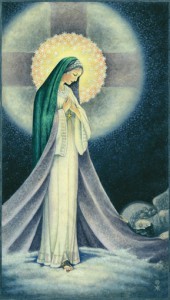 information found at: http://catholictradition.org/Mary/snows.htm
information found at: http://catholictradition.org/Mary/snows.htm
A WEALTHY aristocrat and devout Christian known by tradition as John lived in Rome in the fourth century. He and his wife had no children, and were fearful that their lack of an heir would put an end to the family’s long prominence in the government of the city. They had often prayed for a child but without success. One day John’s wife said, “Let us ask the Blessed Virgin to nominate an heir.” They did so, and their prayer was answered dramatically.
SNOW IN AUGUST
In August 352 a rectangle of snow was discovered on Mount Esquiline, one of the famous Seven Hills. Snowfall of any sort was unheard of in Rome at that time of year, but that it had fallen only in one place and in such a specific pattern was regarded as a phenomenon. People crowded to see the patch of snow, which persisted despite the heat. John was convinced that its shape and size indicated that a church should be built on the spot. In fact both John and the Pontiff had dreamt that Our Lady desired a church to be built on Mount Esquiline. The Holy Father was so moved by his dream that he visited the mysterious snowfall. When he arrived with his retinue, John and his wife were already there kneeling in prayer to the Virgin.
As soon as the plot for the building had been staked out the snow melted. John met the cost of the building, which was completed in 354 and was dedicated the Basilica Liberiana. Seventy years later the church was rebuilt on a grander scale by Pope Sixtus III, who added decorations and ornaments of silver. From then the church was known as Basilica Sixti and the Church of Santa Maria Maggiore [St. Mary Major].
THE PRODIGY OF THE SNOW IS TRUE
The new basilica housed a celebrated painting provided by the Pope. It had belonged to St. Helen, the mother of the Emperor Constantine—–the same Helen who, according to tradition, had made a pilgrimage to Palestine and discovered the original Cross of Christ. The picture, painted on a slab of cedar wood, is of a Madonna and Child. [We were unable to obtain a print of the painting.] The infant Jesus is holding a book and both figures are haloed and crowned—–the crowns presented by Pope Gregory XVI in 1832 as a thank-offering for deliverance from cholera.
The so-called ‘new’ Lady Chapel was built by Pope Paul V in 1613 to house the miraculous painting. He declared, “This image should have a magnificent place of its own, befitting its eminence. For it has always been regarded by all faithful people and through it many miracles and wonders have been wrought.”
Salus Populi Romana [Salvation of the Roman People] is the title of this famous painting and it is rightly named because for centuries the people of Rome have prayed before it in times of famine, war and national crisis.
Many popes have held the basilica on Mount Esquiline in particular regard. When Gregory I was Pope [590-604] Rome was ravaged by a plague. Gregory carried the image of the Holy Mother in procession from the chapel as far as Hadrian’s Mausoleum. When the procession arrived they heard an invisible heavenly choir singing Regina Caeli. When the Pope asked the Virgin to pray for the city he saw an apparition of St. Michael replacing the sword of vengeance in its scabbard. The plague abated.
Pope Benedict XIV had a special affection for the legend. In 1427 he declared, “It must be acknowledged that nothing is wanting to enable us to affirm with moral certainty that the prodigy of the Snow is true: Benedict XVI attended the holy picture every Saturday and prayed the Litany. The night before he died, Paul V asked to be taken to the Chapel of the Blessed Virgin in order to pray before her image. St. Ignatius Loyola, founder of the Society of Jesus, said his first Mass here at Christmas 1538.
ANGELS SING THE RESPONSES
The Chapel of the Virgin Salus Populi Romani [Protectress of the Roman People] is very close to the historic heart of the Catholic Church, so it is not surprising that many stories have enriched its tradition over the centuries. It is said that once when Pope Gregory the Great was celebrating Mass in the chapel and intoning the words “Pax Domini sit semper vobiscum,” he heard a choir of Angels sing the response “Et cum spiritu tuo.” From that day the custom in the chapel was to omit that section of the Mass in the belief that it was being offered and sung by the Angels.
THE BASILICA TODAY
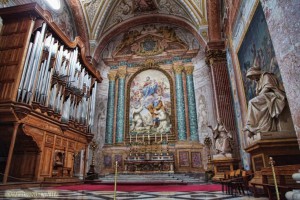 The present-day church is one of the largest basilicas in the world and its Patronal Festival is held on August 5 in remembrance of the miracle of the snow. During this celebration hundreds of white blossoms are showered from the dome of the chapel. Not to be missed are the thirteenth-century mosaics on biblical themes and the frescoes by Reni and Della Porta. There is an imposing Romanesque belltower erected in 1377.
The present-day church is one of the largest basilicas in the world and its Patronal Festival is held on August 5 in remembrance of the miracle of the snow. During this celebration hundreds of white blossoms are showered from the dome of the chapel. Not to be missed are the thirteenth-century mosaics on biblical themes and the frescoes by Reni and Della Porta. There is an imposing Romanesque belltower erected in 1377.
Santa Maria Maggiore has a further claim to fame. In the seventh century a relic was brought from Bethlehem and traditionally venerated as the manger in which the Christ Child was laid at the first Christmas. And so another name for the great basilica is St. Mary of the Crib.
One of the most spectacular sights which meets today’s pilgrim is the triumphal arch which extends to almost 66 feet. It is decorated in four horizontal sections. In the middle at the top God’s throne is set in a circle, with St. Peter and St. Paul on either side. Above this mosaic are the symbols of the four Gospel writers.
On November 12, 1964 Pope Paul VI made a pilgrimage to the basilica and solemnly proclaimed Our Lady “Mother of the Church.”
Permanent link to this article: https://bookofheaven.org/2015/08/05/feast-of-our-lady-of-snows/
Jul 27
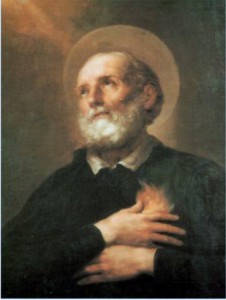 Five hundred years ago today, on July 21 1515, St Philip Neri, the founder of the Oratorians was born in Florence. It is an anniversary that is dear to my heart, because a key reason I moved to London was to be near the London Oratory and be in a position to assist at Mass there. When the London Oratory was first opened in 1884, the Brompton Road location was thought to be removed from the centre of town, an idea that surely makes St Philip chuckle in Heaven today!
Five hundred years ago today, on July 21 1515, St Philip Neri, the founder of the Oratorians was born in Florence. It is an anniversary that is dear to my heart, because a key reason I moved to London was to be near the London Oratory and be in a position to assist at Mass there. When the London Oratory was first opened in 1884, the Brompton Road location was thought to be removed from the centre of town, an idea that surely makes St Philip chuckle in Heaven today!
St Philip spent 60 years in the Eternal City, and is known as the Apostle of Rome. He would spend whole nights in deep prayer in the Catacombs and during the day he would visit the sick in hospital. St Philip is often called the founder of a religious order, but this is not true, because The Oratorians are not a religious order at all. They are a group of secular priests living in a community under a rule. But each Oratorian does not lead the life of a secular priest – they are not moved from church to church by their bishop. A man who feels called to be an Oratorian enters a particular Oratory with the intention of remaining there all his life. But each priest is not bound to the Congregation of the Oratory by a vow or promise, and is free at any time to leave and join a religious order. What is the bond that binds them? They are united by a bond of love, which is fitting because their founder is the patron saint of joy. Every house of the Oratory governs itself and is independent of the others.
The very beginning of the Congregation of the Oratory was in around 1552 when St Philip would gather groups of young laymen for prayer, discussion and reading. Over time, these meetings were moved from St Philip’s private quarters to “an oratory” (which simply means a place of prayer). In the first instance, they found a place in the church of San Girolamo. The Congregation grew from these very prayer meetings, and one of St Philip’s favourite expressions was, “give me ten truly detached men and I do not despair of converting the world with them.”
For modern Catholics, the Oratory signifies loyalty to Rome, while having remarkably reverent liturgies. Nowadays attending the Oratory (perhaps in the Oxford Oratory or in the Brompton Oratory) has become synonymous with a desire to worship in a pre-Vatican II way. But down through the years, I’ve known Catholics of all stripes who love to pray there because there is a time of silence before and after Mass, which allows the brain to become quiet, freeing it from noisy distractions that might divert our attention from raising our hearts and minds to God. The odd time I have seen a celebrity a few pews away, but never have I seen someone interrupt them when they are praying. The Oratory is a selfie-free zone.
The heart of St Philip’s apostolate, bringing people together in prayer in “an oratory”, is still beating strong and is a source of spiritual lifeblood to the many who attend the Oratories all over the world. St Philip was canonised in 1622 on the same day as St Teresa of Avila, St Ignatius and St Isidore. The joke that went round Rome was, “today they canonised three Spaniards and one saint”.
V10 – 1.17.11 – “Daughter, what you wrote about the Reunions of Priests is nothing but a process that I AM making with them. If they listen to Me – fine. But if they don’t, since the leaders of the ecclesiastics will not listen to Me because they too are bound by the laces of interest, and are slaves of human miseries, almost lapping them up – instead of dominating over those miseries, of interest, of high positions and the like, the miseries dominate them; therefore, since they are deafened by what is human, I will be neither understood nor listened to – I will turn to the civilian leaders, who will listen to Me more easily. Because of their desire to see the priest humiliated, and also because maybe these are a little more stripped than the ecclesiastics themselves, My Voice will be more listened to; and what they do not want to do out of love, I will make them do by necessity and by force, and I will make the government take away what is left to them.”
And I: ‘My Highest and only Good, what will be the name to be given to these Houses, and what the Rules?’
And He: “The name will be: The Houses of the Resurrection of the Faith. As for the Rules, they can use the same Rules as the Oratory of Saint Philip Neri.”
click here for more on St. Philip Neri
Permanent link to this article: https://bookofheaven.org/2015/07/27/st-philip-neri-founder-of-the-oratorians/
Jul 25
Make this special plenary indulgence known to those on your email list!
Please make plans to attend Holy Mass, receive Communion, and then go to the Sacrament of Confession – eight days before or after Aug. 2
The conditions to obtain the Plenary Indulgence of the Forgiveness of Assisi is (for oneself or for a departed soul) is as follows:
The Portiuncula Indulgence is a grace not to be missed—not only for yourself but for the many suffering souls in Purgatory. …
Sacramental Confession to be in God’s grace (during eight days before or after.) …
Participation in the Holy Mass and Eucharist …
Recitation of The Apostles Creed, Our Father and also a prayer for the Pope’s Intention (such as an Our Father, Hail Mary, etc.).
Mark your calendar for the Feast of Our Lady of the Angels beginning at Vespers (Noon) on the First of August to August 2nd at Midnight. Tell everyone of the magnitude of this gift. Once again, we see the unfathomable Divine Mercy of God.
http://dcsfo.org/portiuncula_indulgence_pamphlet.pdf read more
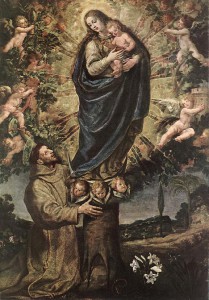 Saint Francis of Assisi and Great Pardon Known as the The Portiuncula Indulgence
Saint Francis of Assisi and Great Pardon Known as the The Portiuncula Indulgenceby Susan Tassone
The Portiuncula (small portion) refers to the land in Assisi, Italy, that belonged to the Benedictines.
On this land was an old church dedicated to the Virgin Mother of God but abandoned.
The great St. Francis had great devotion to the queen of the world and when he saw that the church was deserted, he began to live there constantly and repair it. He heard that the angels often visited it, so that it was called St. Mary of the Angels.
The Benedictines wanted to give Francis the church but in order to remain faithful to Lady Poverty, Francis rented it from them with the annual compensation of a basket of fish from the Tescio river.
Here is where Francis began his service to Christ and His Church. Here Francis founded his Order, received Clare as his spiritual daughter, and where he died commending this spot above all others to the friars.
St. Francis had great love and compassion for everyone.
On a night of July, 1216, Francis was praying in the little church of the Portiuncula devoured by love for God and a thirst to save souls. He prayed for the forgiveness of sins of mankind.
Suddenly a brilliant light shone all around. In great splendor Jesus and Mary appeared in the midst of a dazzling cloud surrounded by a multitude of radiant angels.
Out of fear and reverence, St. Francis adored Our Lord prostrate upon the ground.
Then Jesus said to him: “Francis you are very zealous for the good of souls. Ask me what you want for their salvation.” St. 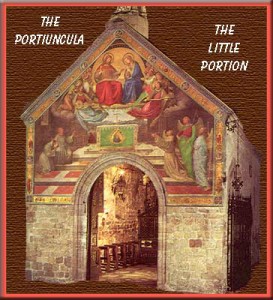 Francis was rapt in ecstasy before Jesus.
Francis was rapt in ecstasy before Jesus.
When he regained his courage he said:
“Lord, I a miserable sinner beg You to concede an indulgence to all those who enter this church, who are truly contrite and have confessed their sins. And I beg Blessed Mary, your Mother, intercessor of man, that she intercede on behalf of this grace.”
Our Lady at once began to beseech her son on behalf of Francis. Jesus answered:
“It is a very great thing that which you ask Me; but you are worthy of even greater things, Friar Francis, and greater things you will have. So I accept your request, but I want you to go to my Vicar, to whom I have given the power to bind and loose in Heaven and on earth, to ask him on my behalf for this indulgence.”
With one of his companions, Francis hastened to Pope Honorius III and prostrate implored him to proclaim that every one visiting the church and confessing their sins with a contrite heart would be as pure from all sin and punishments as he was immediately after baptism. The Pope granted this petition. This indulgence has been extended to all parish churches throughout the world.
The date was set from vespers of the first of August until sundown on the second of August, the Feast of Our Lady of the Angels. It is said that St. Francis was given this day by Our Lord because the Feast of the Chains of St. Peter celebrated on August first is the day Peter was released from prison and his chains removed. This is an extraordinary demonstration of God’s mercy in removing the chains of sin from those who devoutly and faithfully seek to gain the indulgence by completing its requirements.
The conditions to obtain the Plenary Indulgence of the Forgiveness of Assisi is (for oneself or for a departed soul) as follows:
— Sacramental Confession to be in God’s grace (during eight days before or after.)
— Participation in the Holy Mass and Eucharist
— Recitation of The Apostles Creed, Our Father and a prayer for the Pope’s Intention.
The Portiuncula Indulgence is a grace not to miss not only for yourself but for the many suffering souls in Purgatory.
Mark your calendar for the Feast of Our Lady of the Angels beginning on the First of August to August 2.
Tell everyone of the magnitude of this gift. Once again, we see the unfathomable Divine Mercy of God.
In the words of St. Francis: O my Brothers and Sisters, I want you all to go to Heaven!
Permanent link to this article: https://bookofheaven.org/2015/07/25/the-portiuncula-indulgence-2/
Jul 25
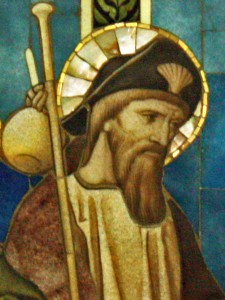 click image for information about St. James the Greater
click image for information about St. James the Greater
“…the poor, the ignorant, are more simple, they are less attached to their own judgment, and therefore more favored, more blessed, and preferred by my dear Son; so much so, that He chose poor fishermen as Apostles and pillars of the future Church.”
Permanent link to this article: https://bookofheaven.org/2015/07/25/feast-of-st-james-the-greater-apostle/
Jul 11
[1] A psalm for David himself. Be not emulous of evildoers; nor envy them that work iniquity. [2] For they shall shortly wither away as grass, and as the green herbs shall quickly fall. [3] Trust in the Lord, and do good, and dwell in the land, and thou shalt be fed with its riches. [4] Delight in the Lord, and he will give thee the requests of thy heart. [5] Commit thy way to the Lord, and trust in him, and he will do it.
[6] And he will bring forth thy justice as the light, and thy judgment as the noonday. [7] Be subject to the Lord and pray to him Envy not the man who prospereth in his way; the man who doth unjust things. [8] Cease from anger, and leave rage; have no emulation to do evil. [9] For the evildoers shall be cut off: but they that wait upon the Lord shall inherit the land. [10] For yet a little while, and the wicked shall not be: and thou shalt seek his place, and shalt not find it.
[11] But the meek shall inherit the land, and shall delight in abundance of peace. [12] The sinner shall watch the just man: and shall gnash upon him with his teeth. [13] But the Lord shall laugh at him: for he foreseeth that his day shall come. [14] The wicked have drawn out the sword: they have bent their bow. To cast down the poor and needy, to kill the upright of heart. [15] Let their sword enter into their own hearts, and let their bow be broken.
[16] Better is a little to the just, than the great riches of the wicked. [17] For the arms of the wicked shall be broken in pieces; but the Lord strengtheneth the just. [18] The Lord knoweth the days of undefiled; and their inheritance shall be for ever. [19] They shall not be confounded in the evil time; and in the days of famine they shall be filled: [20] Because the wicked shall perish. And the enemies of the Lord, presently after they shall be honoured and exalted, shall come to nothing and vanish like smoke.
[21] The sinner shall borrow, and not pay again; but the just sheweth mercy and shall give. [22] For such as bless him shall inherit the land: but such as curse him shall perish. [23] With the Lord shall the steps of a man be directed, and he shall like well his way. [24] When he shall fall he shall not be bruised, for the Lord putteth his hand under him. [25] I have been young, and now am old; and I have not seen the just forsaken, nor his seed seeking bread.
[26] He sheweth mercy, and lendeth all the day long; and his seed shall be in blessing. [27] Decline from evil and do good, and dwell for ever and ever. [28] For the Lord loveth judgment, and will not forsake his saints: they shall be preserved for ever. The unjust shall be punished, and the seed of the wicked shall perish. [29] But the just shall inherit the land, and shall dwell therein for evermore. [30] The mouth of the just shall meditate wisdom: and his tongue shall speak judgment.
[31] The law of his God is in his heart, and his steps shall not be supplanted. [32] The wicked watcheth the just man, and seeketh to put him to death, [33] But the Lord will not leave in his hands; nor condemn him when he shall be judged. [34] Expect the Lord and keep his way: and he will exalt thee to inherit the land: when the sinners shall perish thou shalt see. [35] I have seen the wicked highly exalted, and lifted up like the cedars of Libanus.
[36] And I passed by, and lo, he was not: and I sought him and his place was not found. [37] Keep innocence, and behold justice: for there are remnants for the peaceable man. [38] But the unjust shall be destroyed together: the remnants of the wicked shall perish. [39] But the salvation of the just is from the Lord, and he is their protector in the time of trouble. [40] And the Lord will help them and deliver them: and he will rescue them from the wicked, and save them, because they have hoped in him.
Permanent link to this article: https://bookofheaven.org/2015/07/11/psalm-36-an-exhortation-to-despise-this-world-and-the-short-prosperity-of-the-wicked-and-to-trust-in-providence/
Permanent link to this article: https://bookofheaven.org/2015/07/09/thy-kingdom-come-thy-will-be-done-on-earth-as-it-is-in-heaven/
Jul 08
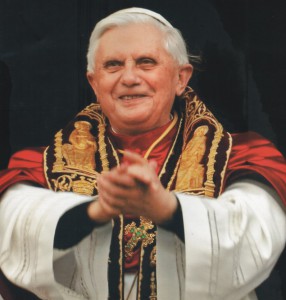 4 JULY 2015
4 JULY 2015
Your Eminence!
Your Excellencies!
Distinguished Rectors!
Eminent Professors!
Ladies and Gentlemen!
At this time I can do none other than express my great and most heartfelt gratitude for the honor that you have given me in awarding me the doctorate honoris causa. I thank the dear Cardinal Stanislaw Dziwisz, Lord Chancellor, and the academic authorities of both universities. I am especially delighted by the fact that, in this way, my bond with Poland, with Krakow, with the homeland of our great Saint John Paul II, has become even stronger. Indeed, without him, my spiritual and theological development is not even imaginable. By his living example he showed us how the joy of great sacred music can go together with the task of common participation in the sacred liturgy, just as grandiose joy can accompany the simplicity of a humble celebration of faith.
In the post-conciliar years, a very ancient conflict about this point arose with renewed passion. I myself grew up in the region of Salzburg, marked by the great tradition of that city. There it went without saying that feast day Masses accompanied by a choir and orchestra were an integral part of our experience of faith in the celebration of the liturgy. It remains indelibly impressed on my memory how, for example, no sooner than the first notes of the Mozart Coronation Mass sounded, the heavens practically opened and one experienced the Lord’s presence very profoundly. (And my thanks also to you, who arranged for me to listen to Mozart, and also to the choir: some great pieces!)
Still, together with this, the new reality of the Liturgical Movement was also already present – above all, via one of our chaplains who later became vice regent and then rector of the major seminary of Freising. Later, during my studies in Munich, I entered in a much more concrete way into the Liturgical Movement by means of the classes of Professor Pascher, one of the most important experts of the Council in liturgical matters; and above all I entered in via the liturgical life of the seminary community. Thus, bit by bit, the tension between participatio actuosa true to the liturgical spirit and the solemn music that enfolded the sacred action became perceivable, even if I did not yet notice it so strongly.
In the Constitution on the Liturgy of the Second Vatican Council it is written very clearly: “The patrimony of sacred music is to be conserved and built up with great care” (114). On the other hand, the text stresses as a fundamental liturgical category the participatio actuosa of all the faithful in the sacred action. Those things which, in the Constitution, were still peacefully together, were thereafter, in the reception of the Council, often seen in a relationship of dramatic tension. Significant circles of the Liturgical Movement held that, in the future, only concert halls could accommodate the great choral works and even orchestral Masses, not the liturgy. Here, rather, there could only be space for the common singing and prayer of the faithful. What’s more, there was dismay for the cultural impoverishment of the Church that would necessarily follow from this. In what way, then, could the two sides be reconciled? How could the Council be carried out in its entirety? These were the questions that weighed down upon me and on many other faithful – from ordinary people to those having a theological formation.
Perhaps it is appropriate at this point to pose the fundamental question: What, in reality, is music? Where does it come from and what is its aim?
I think that we can pinpoint three “places” from which music originates.
One of its first sources is the experience of love. When men were seized by love, another dimension of being opened up to them – a new greatness and breadth of reality. And this led even to a new mode of expression. Poetry, song, and music in general were born from this being struck, from this being awakened to a new dimension of life.
A second origin of music is the experience of sadness – of being touched by death, by pain, and by the depths (abysses) of life. Also in this case, new dimensions of reality opened up in opposite directions; new dimensions which cannot find expression in discourse alone.
Finally, music’s third place of origin is in the encounter with the divine which, from the beginning, is a part of that which defines the human reality. It is this encounter of man with the totally other and the totally great that elicits even more so new ways of expression. As a matter of fact, perhaps it could be said that even in the other two areas – love and death – the divine mystery touches us and, in that sense, it is the fact of being touched by God that constitutes the origin of music, all told. I find it moving to observe how in the Psalms, for example, singing alone does not suffice: appeal is made to all instruments. In this way the hidden music of all creation – its mysterious language – is aroused. With the Psalter, in which the motifs of death and love are also operative, we find ourselves right at the origin of the sacred music of the Church of God. One can say that the quality of music depends upon the purity and the greatness of the encounter with the divine, with the experience of love and of pain. The purer and truer this experience is, the purer and greater also will be the music that is born and develops from it.
At this point I would like to share an idea that lately has increasingly caught my attention, especially as the various cultures and religions become more interconnected. In different cultures and religions there is present a great literary corpus, great architecture, great paintings, and great sculptures. And everywhere, there is also music. But in no other cultural setting is there music of equal greatness to that which arose from the environment of the Christian faith: from Palestrina to Bach, to Handel – all the way to Mozart, Beethoven, and Bruckner. Western music is something unique that has no equal in other cultures. And this – it seems to me – should make us think.
Certainly, western music goes far beyond the religious and ecclesial environments. But, in any case, it finds its most fundamental origins in the liturgy and the encounter with God. In Bach, for whom the glory of God represents the ultimate end of all music, this is quite evident. The great and pure response of western music grew within the encounter with that God who, in the liturgy, makes himself present to us in Christ Jesus. To me, such music is a demonstration of the truth of Christianity. In order for such a response to have developed there was an encounter with truth, with the world’s true Creator. For this reason, great sacred music is a reality of theological rank and of permanent significance for the faith of all of Christendom, even if it is not at all necessary that it should be performed always and everywhere. However, it is also clear that it cannot disappear from the liturgy and that its presence can be an entirely special way to participate in the sacred celebration, in the mystery of faith.
If we call to mind the liturgy celebrated by St. John Paul II on every continent, we see the full breadth of possibilities for expressing the faith in the liturgical event; we see also how the great music of the western tradition is not foreign to the liturgy but is born and developed in it. In this way, it can contribute anew to shaping the liturgy. We do not know the future of our culture and of sacred music. But one thing seems clear to me: wherever the encounter with the living God – who, in Christ, comes to us – really takes place, there is born and grows anew also the response, the beauty of which comes from the truth itself.
The activity of the two universities that have bestowed upon me this doctorate honoris causa – for which I again offer wholehearted thanks – represents an essential contribution so that the great gift of music that comes from the Christian faith tradition might remain alive; also so that it might help to preserve the creative force of the faith even into the future. For this, I thank you all from my heart, not only for the honor you have given me, but also for all the work that you undertake in the service of the beauty of the faith. The Lord bless you all.
Permanent link to this article: https://bookofheaven.org/2015/07/08/address-of-pope-emeritus-benedict-xvi-to-cardinal-dziwisz-and-academic-authorities-of-two-polish-universities/